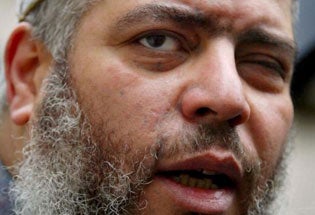Human rights court halts Hamza extradition

Human rights judges today ordered a halt to the extraditions of Babar Ahmad and radical preacher Abu Hamza, both wanted in the US on terror charges.
The Strasbourg court said it wanted more time to examine possible human rights breaches if the men face trial on charges which could mean life sentences without parole.
Ahmad, a 36-year old computer expert, has been in a UK prison without trial for nearly six years, refused bail since his arrest in August 2004 on a US extradition warrant.
Radical preacher Hamza is also wanted on terror charges in the US.
Both appealed separately to the European Court of Human Rights on the grounds that their treatment and potential punishment could violate Human Rights Convention provisions on the "prohibition of torture and inhuman or degrading treatment".
The appeal prompted a stay of extradition proceedings pending today's verdict, which further postponed a final decision.
The ruling gives the UK Government until September 2 to submit observations and declares: "The (Human Rights) Court decided to prolong, until further notice, the interim measures it had adopted indicating to the UK Government that it was in the interests of the proper conduct of the proceedings that the applicants should not be extradited while the cases were being examined by the court".
Two other British nationals wanted in the US - Haroon Rashid Aswat and Seyla Talha Ahsan - have also been granted more time before extradition warrants can be carried out.
All four men were described by the Human Rights Court today as "alleged international terrorists", indicted on various charges.
The judges dismissed claims that US trial procedures would amount to a denial of justice, or that any of the four would be designated as "enemy combatants" and therefore exposed to a possible death penalty if convicted.
However, said today's ruling, there was a real risk that, in the case of "post-trial detention", Mr Ahmad, Mr Aswat and Mr Ahsan would be held at a "supermax" jail, - the US Penitentiary, Administrative Maximum, Florence, Colorado - known for short as "ADX Florence".
That raised concerns about breaches of Human Rights Code Article 3 on torture and inhuman or degrading treatment:
"Their complaints under Article 3 concerning the stringency of conditions there for what could be the rest of their lives (raises) serious questions of fact and law of such complexity that the Court (has) to examine them on their merits," said the judges.
In the case of Abu Hamza, however, the complaint about ADX Florence did not apply, "as he would at most risk spending a short period of time there and only until such time as his state of health was assessed".
Home Secretary Theresa May said: "We note that the European Court of Human Rights has decided that all the applications are partly admissible.
"We await the Court's judgment on the case. In the meantime these individuals will remain in custody."
All four were charged by the US between 2004 and 2006 and remain in UK jails pending extradition.
Ahmad and Ahsan are accused of providing support to terrorists and conspiracy to kill, maim or injure people and damage property in a foreign country.
Egyptian-born Abu Hamza is wanted in connection with 11 charges related to taking 16 hostages in Yemen in 1998, promoting violent jihad in Afghanistan in 2001 and conspiring to set up a jihad training camp in Oregon, America. Aswat is accused of conspiring with Abu Hamza to establish the camp.
The Human Rights judges rejected their claims that America would renege on diplomatic assurances that the four men would get fair trials, and would not be designated "enemy combatants" if found guilty.
The judges said there was no reason to believe that the US would breach the terms of the assurances, and there was therefore no risk of their trials amounting to "a flagrant denial of justice". Neither would any of the four be named as enemy combatants, nor would they be "subject to extraordinary rendition".
But the concerns about the "supermax" prison ADX Florence remained regarding three of the men, and all four were covered by another question the Human Rights judges wanted to consider further - does the Eight Amendment to the US Constitution (prohibition of "cruel and unusual punishment") give the equivalent protection to Article 3 of the European Human Rights Convention?
The judgment concluded: "The (UK) Government has been asked to submit observations by September 2. The applicants will then be given an opportunity to respond to those observations, after which the Government will be invited to submit its final observations in reply. The Court will then give its judgment."
Join our commenting forum
Join thought-provoking conversations, follow other Independent readers and see their replies
Comments